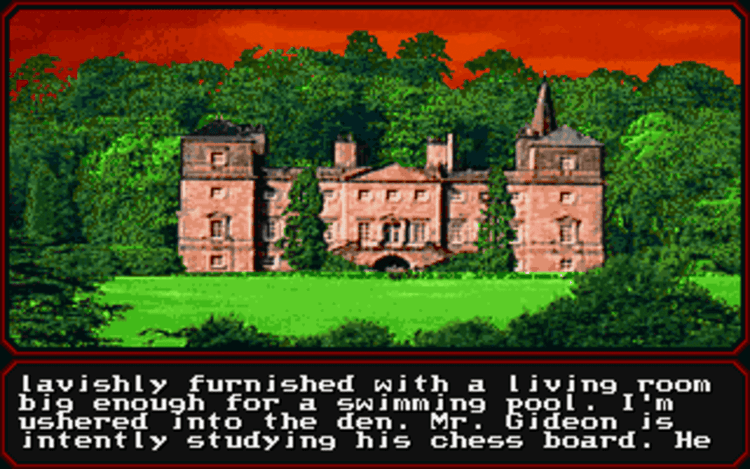
Mean Streets is a pioneering detective adventure published by Access Software in 1989. Set in a futuristic, neo-noir San Francisco, the game invites players to step into the shoes of Tex Murphy, a down-on-his-luck private investigator tasked with unraveling a mysterious death. Its engaging mix of interrogations, exploration, and flight simulation evokes the atmospheric intensity of Blade Runner while offering investigative depth reminiscent of L.A. Noire. With digitized characters and groundbreaking VGA graphics, Mean Streets remains a compelling game that continues to captivate enthusiasts of classic adventure titles.
Mean Streets is a timeless DOS adventure that still resonates with fans of classic detective games. Developed and published by Access Software in 1989, the game introduced gamers to Tex Murphy—a gritty, resourceful private investigator navigating a dystopian future where high-tech intrigue meets film noir sensibilities. In a world reminiscent of cyberpunk classics, Mean Streets delivers an experience that is both narratively engaging and technically innovative for its era.
Mean Streets set the stage for a series that would redefine adventure gaming. In this original installment, players assume the role of Tex Murphy, a weary detective with a penchant for sharp wit and dogged determination. The narrative unfolds in a post-apocalyptic San Francisco of the early 2030s, where societal decay and advanced technology coexist in a bleak urban landscape. Tex is drawn into a perplexing investigation when Sylvia Linsky, the daughter of a renowned university professor, hires him to determine whether her father’s mysterious death was a suicide or a carefully orchestrated murder. As Tex delves deeper, he discovers that the case is entangled with broader conspiracies involving secret projects and influential figures. The game’s story is layered and atmospheric, inviting players to piece together clues and interrogate a cast of memorable, digitized characters—a hallmark that distinguished Mean Streets from other titles of its time.
Mean Streets stands out for its innovative blend of genres. While its core gameplay centers on adventure and mystery, the game also integrates elements of flight simulation. Early on, players pilot Tex’s Lotus Speeder—a futuristic flying car that serves as the primary means of traversing the sprawling urban environment. Although the aerial sequences can feel methodical, they contribute significantly to the immersive realism of the game, emphasizing the difficulty of travel in a decaying metropolis. Beyond the thrills of the cockpit, players engage in a series of investigative encounters. They must accurately type the names of characters and objects to extract information, bribe or threaten uncooperative witnesses, and decipher coded addresses that lead to new locations. This unique mix of dialogue-driven inquiry and exploration sets Mean Streets apart as a game that demands both mental acuity and patience. The atmospheric visuals, powered by early VGA graphics and the groundbreaking RealSound technology, ensure that every scene is imbued with a sense of gritty authenticity that continues to captivate modern players.
For enthusiasts eager to experience this classic detective saga, there is a growing trend toward playing Mean Streets online. Many modern portals now offer the game free to play directly in a web browser, with support for mobile devices ensuring that the adventure is accessible without the need for legacy hardware or complex installations. Players can enjoy Tex Murphy’s investigation on a variety of devices—be it a desktop computer, tablet, or smartphone—without sacrificing the charm and challenge of the original title. This accessibility not only revives a piece of gaming history but also introduces a new generation of gamers to a story that is as compelling as it is historically significant. By removing technical barriers, the online version ensures that the immersive detective narrative, complete with realistic urban backdrops and intuitive yet demanding controls, remains available to all who wish to play.
As players navigate the labyrinthine streets of a futuristic San Francisco, they quickly learn that Mean Streets is not merely a game but an evolving detective novel. Every interaction with its eclectic cast—from nervous informants and skeptical bystanders to corrupt officials—adds a unique piece to the puzzle. The game encourages thorough note-taking and careful analysis of clues, as the narrative is designed to reward players who persist in unraveling its mysteries. The investigative process is as much about understanding human nature as it is about deciphering codes and solving puzzles. This reflective quality has ensured that Mean Streets retains its appeal across generations, bridging the gap between early digital adventures and the rich narrative experiences found in modern storytelling.
Graphically, Mean Streets was a pioneer. It was among the first DOS games to fully exploit the potential of VGA graphics, rendering detailed urban environments and lifelike character portraits using 256 colors—a technical feat that set it apart in a time when most games were limited by far simpler visuals. Moreover, the integration of RealSound technology allowed for digitized audio effects that provided voice snippets and ambient soundscapes, adding depth and authenticity to the gameplay. These innovations not only enhanced the gaming experience at the time of its release but have also contributed to its enduring legacy as a milestone in interactive entertainment.
The game’s controls, though primitive by modern standards, were ingeniously designed to challenge players. Movement is managed via the keyboard, with specific commands required to interact with the environment, manage inventory, and engage in dialogue. While the necessity of typing exact names for interactions might seem archaic today, it is precisely this meticulousness that imbues the experience with a sense of realism and tension. Each command feels weighty, as every decision can influence the outcome of the investigation. The deliberate pace of gameplay encourages thoughtful exploration rather than fast-paced action, creating an atmosphere of suspense that mirrors the cautious, methodical nature of true detective work.
Mean Streets is a rich tapestry of narrative innovation, technical prowess, and immersive gameplay that has not only defined a genre but has also paved the way for future detective adventures. Its enduring appeal lies in its ability to transport players to a meticulously crafted world where every clue matters and every choice has consequences. As players guide Tex Murphy through the neon-lit alleyways and foggy streets of a dystopian future, they become part of a living, breathing mystery that challenges them to think, observe, and deduce.
For those looking to master the controls, the game offers a straightforward yet challenging interface that relies on keyboard inputs for movement, interaction, and navigation.
All the game’s source codes and underlying mechanics are publicly available, reaffirming that the creative vision belongs solely to its original authors. Mean Streets continues to be a testament to the ingenuity of early adventure gaming and remains a must-play classic for both nostalgic veterans and newcomers alike.
Share game
Share game








Share game